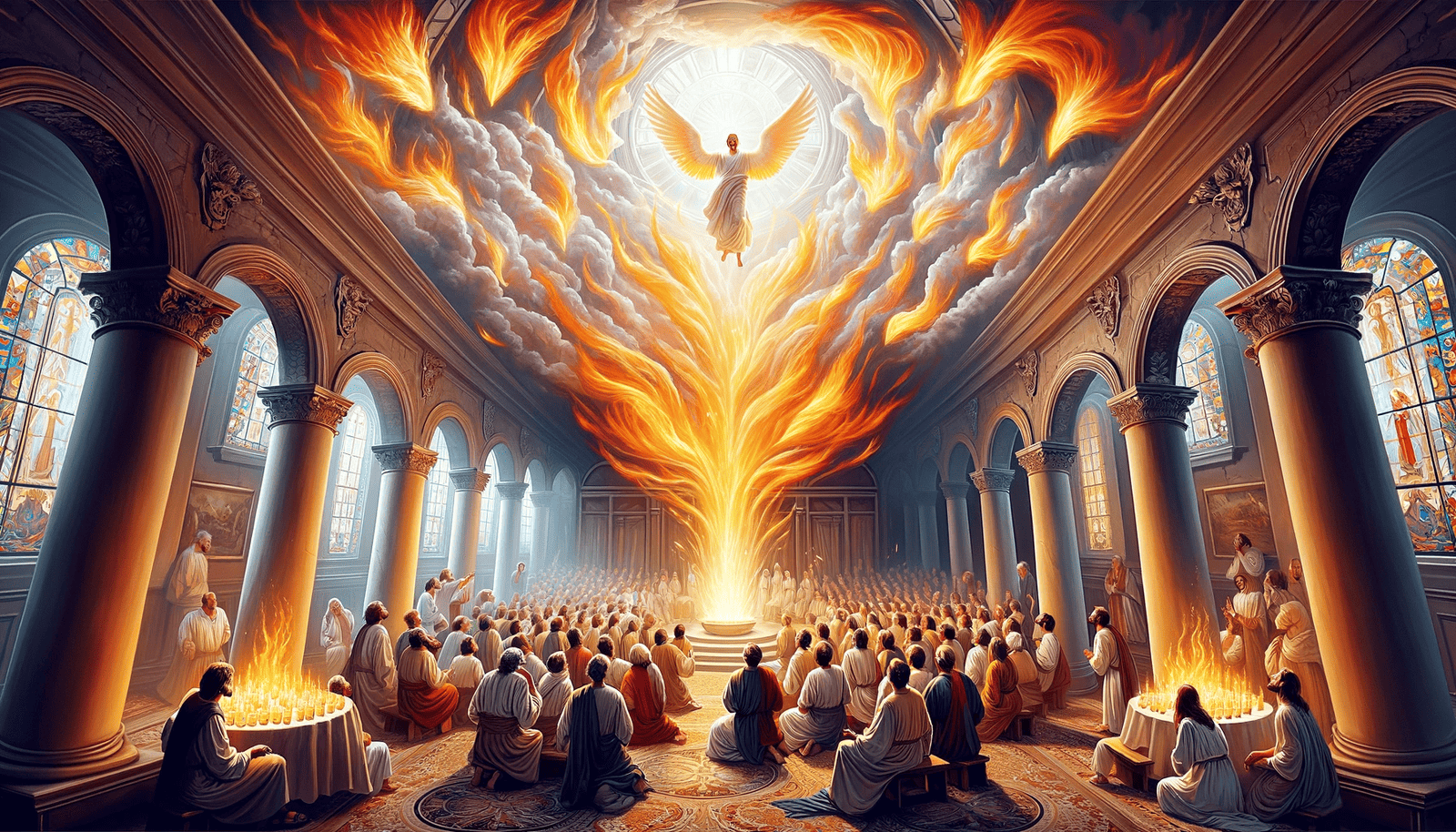In the Bible, the Day of Pentecost holds a dual significance, celebrated in both the Old and New Testaments.
How Does the Day of Pentecost Connect to Modern Faith Practices?
The Day of Pentecost remains a pivotal event for Christians, as it marks the outpouring of the Holy Spirit on believers. Today, pentecost traditions modern faith practices, emphasizing the significance of spiritual empowerment and the communal nature of faith. This connection serves as a reminder of the ongoing relevance of Pentecost in contemporary faith.
Day Of Pentecost Old and New Testament Meanings
Firstly, in the Old Testament, it’s known as the Feast of Weeks or Shavuot (Leviticus 23:15-16). Celebrated fifty days after Passover, it marked the completion of the wheat harvest and offered gratitude to God for the bounty. It also commemorated the giving of the Ten Commandments to Moses on Mount Sinai.
Secondly, in the New Testament, Pentecost takes on a new meaning following Jesus’ ascension to heaven. As described in Acts 2, the Holy Spirit descended upon the disciples gathered in Jerusalem, empowering them to spread the gospel message and speak in tongues. This event marked the birth of the early Church and the ongoing presence of the Holy Spirit within the Christian community.
Therefore, Pentecost signifies both the culmination of God’s covenant with the Israelites and the beginning of a new era for the Christian faith, making it a pivotal day in biblical history.
What Happened on the Day of Pentecost:
- Fulfillment of Jesus’ Promise:
- Before His ascension, Jesus promised His disciples that they would receive power when the Holy Spirit came upon them (Acts 1:8).
- Gathering of the Disciples:
- The disciples were gathered in one place in Jerusalem, observing the Jewish festival of Pentecost, also known as the Feast of Weeks, a harvest festival occurring 50 days after Passover (Acts 2:1).
- Descent of the Holy Spirit:
- Suddenly, there was a sound like a mighty rushing wind, and tongues of fire appeared and rested on each of them. This signified the Holy Spirit coming upon them (Acts 2:2-3).
- Speaking in Tongues:
- The disciples began to speak in other tongues (languages) as the Spirit enabled them. (Acts 2:4).
- Multicultural Crowd:
- A crowd of people from various nations who were in Jerusalem heard the disciples speaking in their native languages, amazed and perplexed by this phenomenon (Acts 2:5-6).
- Peter’s Sermon:
- Peter stood up and preached to the crowd, explaining that this event was the fulfillment of prophecy and proclaiming the gospel of Jesus Christ (Acts 2:14-36).
- Conversion of Many:
- About 3,000 people were moved by Peter’s sermon, repented, and were baptized. This marked a significant growth in the early Christian church (Acts 2:41).
Benefits of the Day of Pentecost:
- Birth of the Church:
- Pentecost is often considered the birth of the Christian Church, with the Holy Spirit empowering the disciples to begin their global mission.
- Empowerment by the Holy Spirit:
- The coming of the Holy Spirit fulfilled Jesus’ promise and empowered the disciples for ministry, giving them courage, wisdom, and spiritual gifts.
- Foundation for Evangelism:
- The ability to speak in tongues symbolized the gospel’s universality and the Church’s mission to all nations.
- Unity in Diversity:
- The event brought together people of different nationalities and languages, symbolizing the unity of the Church in diversity.
- Fulfillment of Prophecy:
- Pentecost confirmed the fulfillment of Old Testament prophecies, such as those from Joel, and Jesus’ promises about the Holy Spirit.
- Spiritual Renewal and Revival:
- The day marked a moment of spiritual renewal and revival, with a profound impact on the believers and the initiation of a dynamic movement of faith.
- Demonstration of God’s Power:
- The miraculous events displayed God’s power and validated the message of the apostles.
- Formation of Christian Community:
- The conversion and baptism of thousands led to the formation of a supportive and communal Christian society.
- Spread of the Gospel:
- Pentecost initiated the rapid spread of the Gospel message beyond the confines of Judaism, reaching out to the broader Roman Empire and beyond.
- Continued Spiritual Gifts:
- The event set a precedent for the continued presence and work of the Holy Spirit in the lives of believers, including spiritual gifts and guidance.
In summary, the Day of Pentecost was a pivotal moment in Christian history, marking the descent of the Holy Spirit upon the disciples, the birth of the Church, and the beginning of its mission to spread the Gospel to all nations. This event brought numerous benefits, including empowerment for ministry, the fulfillment of prophecy, and the establishment of a unified yet diverse Christian community.
Affiliate Disclosure: "As an Amazon Associate I earn from qualifying purchases made from links in this post. We are a participant in the Amazon Services LLC Associates Program, an affiliate advertising program designed to provide a means for us to earn fees by linking to Amazon.com."

